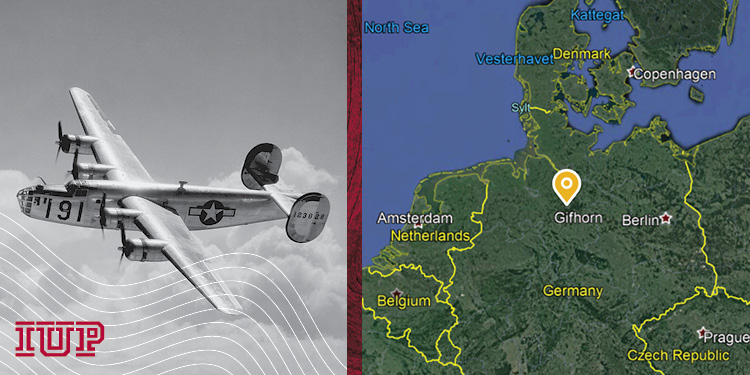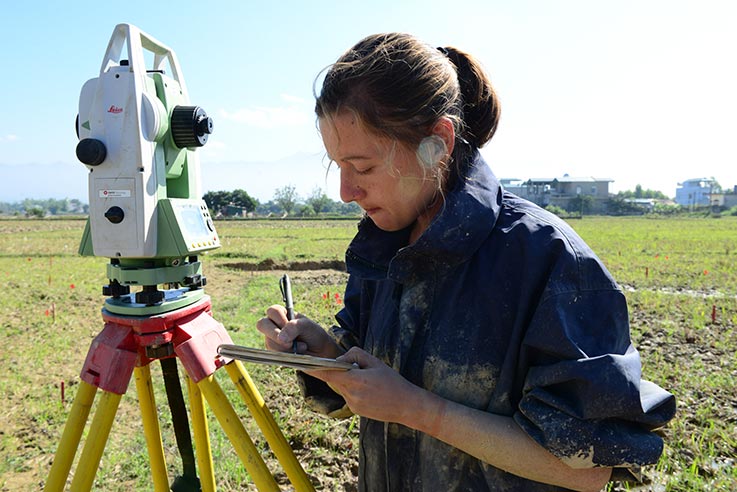 IUP's Department of Anthropology has been selected by the Henry M. Jackson Foundation for the Advancement of Military Medicine Inc. through the Department of Defense POW-MIA Accounting Agency (DPAA) to conduct a field study in Germany at the site of a 1944 crash of a World War II airplane.
IUP's Department of Anthropology has been selected by the Henry M. Jackson Foundation for the Advancement of Military Medicine Inc. through the Department of Defense POW-MIA Accounting Agency (DPAA) to conduct a field study in Germany at the site of a 1944 crash of a World War II airplane.
Additional Resources
Department of Defense POW-MIA Accounting Agency
Forensic Anthropology: Commingled Remains Special Issue
Nine undergraduate students and two graduate students from IUP have joined three students from other universities and a linguist to take part in the field school, scheduled from July 3 to August 15.
IUP Anthropology faculty members Andrea Palmiotto (project director) and William Chadwick are directing the field school.
Before joining the IUP faculty, Palmiotto was a research fellow and then a forensic anthropologist for the DPAA, working at agency laboratories in Nebraska and Hawaii. She worked on cases related to WWII, the Korean War, and the Vietnam War and led archaeological recovery efforts in Vietnam and Laos.
“When I came to IUP, I knew I wanted to maintain that relationship, and I was sure that IUP would be a great fit for a partnership, because of the expertise and experience our faculty have,” she said.
“This is the first time that IUP has worked with this agency,” she said. “We started discussions before the pandemic, and, thankfully, we are able to have the field school this summer.”
The mission of the DPAA is to provide the fullest possible accounting of missing personnel from the nation's past conflicts to their families and to the nation. Under the direction of the secretary of defense, the agency was established on January 30, 2015, to consolidate all aspects of the defense department's accounting community (policy, research, investigations, operations, identifications, and family communications) into a single, accountable defense agency, with a vision of increasing the number of missing personnel accounted for from the nation's past conflicts, while ensuring timely and accurate information is communicated to their families.
“Our partners, like Indiana University of Pennsylvania, enhance the success of the DPAA mission to provide the fullest possible accounting to the families whose service members remain unaccounted for,” Thomas Holland, DPAA Partnerships and Innovations director, said.
Chadwick also brings extensive experience in applied archaeology. He is a registered professional archaeologist and licensed geologist who has broad experience in both geoarchaeology and archaeology. Before joining the IUP faculty, he worked within cultural resource management as a consultant for more than 17 years.
Palmiotto and Chadwick noted that aircraft crash sites are “notoriously hard to dig,” because it's very challenging to determine the scatter of materials created by the crash. The site has been under study since 2012.
“The airplane exploded before crashing, so we know that what we find will be fragmented, and, on top of that, it's been in the ground for more than 70 years, so everything there will be in rough condition.”
“Previous teams have defined the location based on some metal detecting but hadn't really defined the extent of the area based on excavation, so we're not completely sure of the boundaries of the location,” Chadwick said.
The student members of the team had to apply to participate in the project. Most had previous field experience, and about half participated in a six-week archaeological field school directed by Chadwick and Ben Ford that ended in June. The students from that previous field school have all had experience with ground penetrating radar, which will be used at the site in Germany.
“The GPR will be a very important tool to determine the extent of the crater,” Chadwick said. “We need to make sure we get to the bottom of the feature.”
“The airplane exploded before crashing, so we know that what we find will be fragmented, and, on top of that, it's been in the ground for more than 70 years, so everything there will be in rough condition,” Palmiotto said.
Both agreed that this project is an “incredible experience” for the IUP student participants.
“This kind of project is one of the things that makes IUP's program stand out, both at the undergraduate and graduate levels.”
IUP's program, especially the MA in Applied Archaeology, continues to get recognition for providing students with practical experiences outside of the classroom, Chadwick said.
“This kind of project is one of the things that makes IUP's program stand out, both at the undergraduate and graduate levels,” Chadwick said. “We constantly get feedback from employers about how well prepared and trained our graduates are when they enter the workforce. IUP has been recognized as being typically within the top 10 schools each year producing registered professional archaeologists in the nation,” he said.
It will take about a year to analyze any materials found by the IUP team at the site. This analysis will be done at a DPAA laboratory.
“This is an amazing opportunity, and speaking for the entire team, we are very honored and proud to be part of this humanitarian mission and this partnership,” Palmiotto said. “The confidence that they have placed in us and in our expertise is extremely humbling and gratifying.”
About the IUP Faculty Researchers
William Chadwick
 William Chadwick is an archaeological geophysicist, geoarchaeologist, and director of IUP Archaeological Services, housed within the Department of Anthropology. His primary research is on landscape and environmental change related to continuing sea-level change on historic and precontact archaeological sites.
William Chadwick is an archaeological geophysicist, geoarchaeologist, and director of IUP Archaeological Services, housed within the Department of Anthropology. His primary research is on landscape and environmental change related to continuing sea-level change on historic and precontact archaeological sites.
Chadwick holds a PhD in geology from the University of Delaware, where he gained extensive training in archaeological geology, ground penetrating radar, quaternary geology, sedimentology, stratigraphy, and geomorphology. His dissertation, titled “Paleogeographic and Paleoenvironmental Reconstruction of Terrain Associated with Coastal Prehistoric Archaeological Sites, Cape Henlopen, Delaware,” utilized geophysics and intertidal coring to reconstruct the terrains and environments related to the construction of prehistoric shell middens on relict recurved spits in Cape Henlopen State Park, Delaware.
He has conducted numerous geoarchaeological examinations of paleogeographies and paleoenvironments and geophysical surveys related to both historic and precontact archaeological sites and their environs throughout the Mid-Atlantic, Midwestern, and New England regions. Experiences in geomorphic assessments include surveys within glaciated, coastal, and fluvial systems. Notable geomorphic assessments in fluvial settings include deep testing on floodplains of the Schuylkill River and Susquehanna River in Pennsylvania, the Potomac River in Virginia and Maryland, and the Wabash River in Indiana, in addition to smaller rivers and streams.
Other areas of expertise include geospatial predictive modeling, quantitative and statistical analysis, and the utilization of GPS and GIS in archaeological research. His experience in archaeology includes all phases of excavation related to precontact and historic period sites throughout the Mid-Atlantic and New England regions. Chadwick's research interests include archaeological geophysics, intertidal archaeology, and the application of geospatial technology to archaeology.
At IUP, Chadwick teaches courses including World Archaeology, Basic Archaeology, Archaeological Lab Methods, Cultural Resource Management, Archaeological Geophysics, and Geospatial Technologies. He also is an instructor for IUP's six-week field school and advanced field methods course.
Andrea Palmiotto
 Andrea Palmiotto is an archaeologist specializing in zooarchaeology and human osteology. Palmiotto earned her MA and PhD in anthropology from the University of Florida, where she analyzed faunal materials from pre-Columbian coastal sites in Florida, with an emphasis on seasonality and mobility.
Andrea Palmiotto is an archaeologist specializing in zooarchaeology and human osteology. Palmiotto earned her MA and PhD in anthropology from the University of Florida, where she analyzed faunal materials from pre-Columbian coastal sites in Florida, with an emphasis on seasonality and mobility.
Before joining IUP, she worked as a forensic anthropologist with the Defense POW/MIA Accounting Agency, where she led field recoveries in Laos and Vietnam and analyzed skeletal materials leading to the identification of US casualties from WWII, the Korean War, and the Vietnam War.
Palmiotto has extensive experience in academic and professional contexts and has worked with colleagues to publish in numerous peer-reviewed journals. She recently served as a guest editor for Forensic Anthropology on a special issue about commingled human remains. Her zooarchaeological research interests include zooarchaeology of the southeastern United States, coastal and island zooarchaeology, bone tool debitage, seasonality, and subsistence. Her osteology research interests include past-conflict casualty resolution, commingled human remains, perimortem skeletal trauma, and quantification methods.
She is a member of the Register of Professional Archaeologists, American Academy of Forensic Sciences, Society for American Archaeology, and Southeastern Archaeology Conference. She is currently collaborating with researchers from various institutions, including the South Carolina Department of Natural Resources and the DPAA, on a number of different research and field projects.
At IUP, Palmiotto currently teaches Contemporary Anthropology, World Archaeology, North American Archaeology, Zooarchaeology, Human Osteology, and Forensic Anthropology.
About the Defense POW/MIA Accounting Agency
DPAA combined the functions of the former Defense Prisoner of War/Missing Personnel Office, the Joint Prisoner of War/Missing in Action Accounting Command, and the Life Sciences Equipment Laboratory. DPAA today comprises more than 600 highly skilled and talented civilians and members of the military from each of the services (Army, Navy, Marines, and Air Force) and includes historians, research analysts, policy experts, anthropologists, archivists, archaeologists, odontologists, linguists, logisticians, communication experts, field operators, material evidence experts, strategists, and planners, as well as numerous additional support personnel. These professionals, with a wide variety of backgrounds and specialties, are integral to the successful day-to-day operations of the agency's mission.
Personnel from DPAA, along with other US and foreign specialists, research, investigate, recover, and identify remains of Americans unaccounted for from World War II, the Korean War, the Vietnam War, the Cold War, and the Iraq and Persian Gulf wars. When recovery operations are unsuccessful, DPAA professionals work hand-in-hand with service casualty officials (SCOs) to provide answers to family members on the fate of their loved ones.
The analysis and investigation sections also provide historical analysis to help with the identification of recovered remains. At any given time, there are more than 1,000 active cases under analysis.